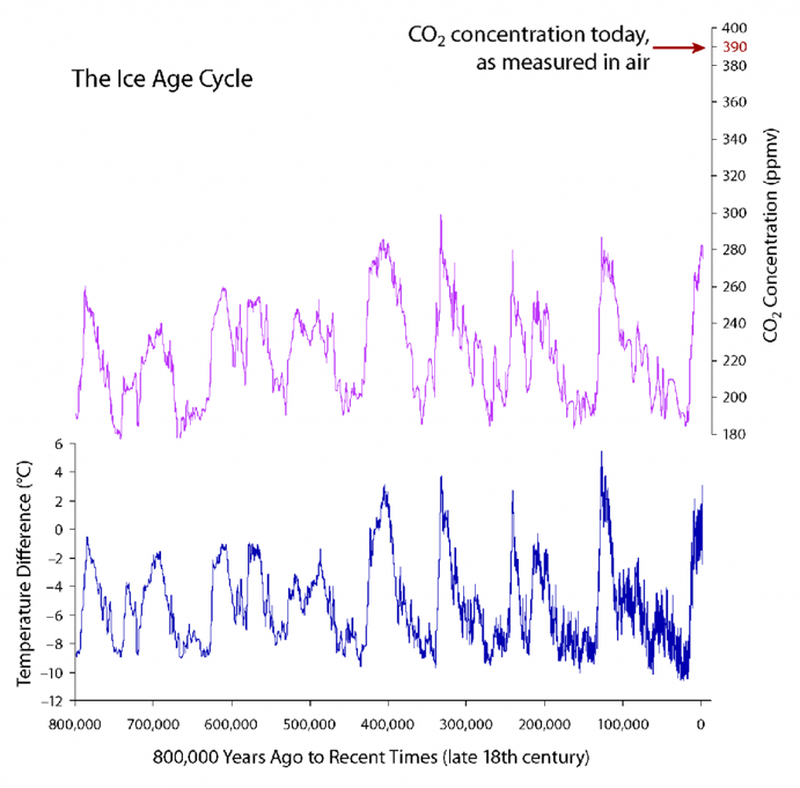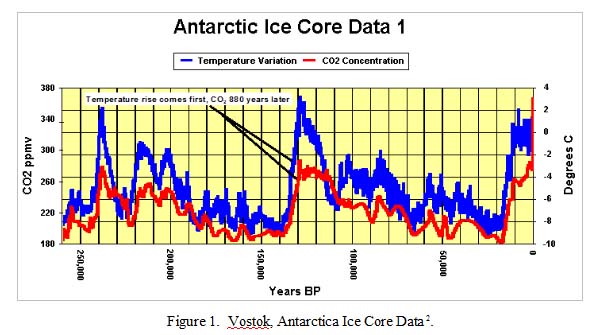Look at that correlation between CO2 and temperature! Which shows that...um...wait...
The pushers of "global warming" have been telling us that CO2 is causing our planet to warm so much that in just ten years we'll all be killed by it. Or maybe just that in ten years it'll be too late to SAVE everyone from being killed. One of the two, surely.
And sure enough! Look at the graphs below. As everyone can plainly see, there's a near-perfect correlation between CO2 and temperature!
And when you realize that "year zero" on the graph is the mid-18th century, and you see how much higher CO2 is today than the historic levels that produced those scary, spikey temperatures...well it's obvious that we're all gonna die, eh?

But if you look closely you see something....interesting: It looks as if some of those temperature spikes (blue) are just a bit left of the supposedly-matching spikes in CO2, eh?
Wait, I'm confused: If CO2 causes global warming, how could temperature increases happen BEFORE CO2 increased? Wouldn't that totally wreck the theory that CO2 causes global warming?
Bingo.
As it turns out, temperature change leads CO2 by about 800 years.
AOC: "But...but...but the correlation is so good! It HAS to prove that CO2 causes warming! The graph above must be wrong! That study must have been funded by Big Oil! Yeah, that's gotta be it!"
===
The above graph is from the Vostok ice cores. Now, what's funny is that if you go to a dozen or so university websites about the Vostok cores you find some VERY interesting things: First, every one of the university sites takes great care to calculate the "correlation coefficient" between temperature and CO2. And wow, it's a great correlation. But they ignore the time problem--i.e. no matter how well two values may be correlated, if event A happens AFTER event B, no known theory supports the conclusion that A could possibly have caused B.
Second: on the few university web pages that admit that CO2 levels do indeed lag temperature (by about 800 years), every site takes pains to note--as an unsupported assertion--that "This does not in ANY WAY contradict the fact that rising CO2 levels cause global warming."
Finally, while every university site shows the beautifully-correlated graphs, it's almost impossible to find the numeric values of the Vostok cores that would enable people to confirm that temperature changes lead CO2 levels instead of CO2 driving temperature.
Here are the conclusions of a French study of the cores:
Nah, that has to be a mistake, citizen.

So with all these "dueling experts," let's go to the "gold standard" of super-smaht scientific thought in the world: Scientific American! Here's an article from 2013:
So...still believe the bullshit claim that "the science is settled"?
And sure enough! Look at the graphs below. As everyone can plainly see, there's a near-perfect correlation between CO2 and temperature!
And when you realize that "year zero" on the graph is the mid-18th century, and you see how much higher CO2 is today than the historic levels that produced those scary, spikey temperatures...well it's obvious that we're all gonna die, eh?

But if you look closely you see something....interesting: It looks as if some of those temperature spikes (blue) are just a bit left of the supposedly-matching spikes in CO2, eh?
Wait, I'm confused: If CO2 causes global warming, how could temperature increases happen BEFORE CO2 increased? Wouldn't that totally wreck the theory that CO2 causes global warming?
Bingo.
As it turns out, temperature change leads CO2 by about 800 years.
AOC: "But...but...but the correlation is so good! It HAS to prove that CO2 causes warming! The graph above must be wrong! That study must have been funded by Big Oil! Yeah, that's gotta be it!"
===
The above graph is from the Vostok ice cores. Now, what's funny is that if you go to a dozen or so university websites about the Vostok cores you find some VERY interesting things: First, every one of the university sites takes great care to calculate the "correlation coefficient" between temperature and CO2. And wow, it's a great correlation. But they ignore the time problem--i.e. no matter how well two values may be correlated, if event A happens AFTER event B, no known theory supports the conclusion that A could possibly have caused B.
Second: on the few university web pages that admit that CO2 levels do indeed lag temperature (by about 800 years), every site takes pains to note--as an unsupported assertion--that "This does not in ANY WAY contradict the fact that rising CO2 levels cause global warming."
Finally, while every university site shows the beautifully-correlated graphs, it's almost impossible to find the numeric values of the Vostok cores that would enable people to confirm that temperature changes lead CO2 levels instead of CO2 driving temperature.
Here are the conclusions of a French study of the cores:
...at the beginning of the deglaciations the CO2 increase either was in phase or lagged by less than ~1000 years with respect to the Antarctic temperature, whereas it clearly lagged behind temperature at the onset of the glaciations.Hmm....so CO2 either "lagged" or "clearly lagged behind" temperature, eh?
Nah, that has to be a mistake, citizen.

So with all these "dueling experts," let's go to the "gold standard" of super-smaht scientific thought in the world: Scientific American! Here's an article from 2013:
Scientists can study Earth’s climate as far back as 800,000 years by drilling core samples from the ice sheets of Greenland and Antarctica. Detailed information on air temperature and CO2 levels is trapped in these cores. And these records show an intimate connection between atmospheric carbon dioxide and temperature in the natural world. In essence, when one goes up, the other one follows."Intimate connection." "When one goes up, the other follows." But of course, correlation ain't worth jack in showing causation. And the author carefully avoids the real issue: which comes first?
There is, however, still a degree of uncertainty about which came first—a spike in temperature or CO2. Until now the most comprehensive records to date on a major change in Earth’s climate came from the EPICA Dome C ice core on the Antarctic Plateau. The data, covering the end of the last ice age, between 20,000 and 10,000 years ago, show that CO2 levels could have lagged behind rising global temperatures by as much as 1,400 years."Could have lagged"? No, the data showed unequivocally that CO2 DID lag temperature. But admitting that would cut against the Narrative that the folks at "Scientific" American are pushing.
“The idea that there was a lag of CO2 behind temperature is something climate change skeptics pick on,” says Edward Brook of Oregon State University. “They say, ‘How could CO2 levels affect global temperature when you are telling me the temperature changed first?’”How indeed?
Frédéric Parrenin...and a team of researchers may have found an answer to the question. His team compiled an extensive record of Antarctic temperatures and CO2 data from existing data and five ice cores drilled in the Antarctic. Their results show CO2 lagged temperature by less than 200 years, drastically decreasing the amount of uncertainty in previous estimates.So has the authoritative Scientific American resolved the question in favor of global warming being cause by CO2? No. They conceded that the new research showed CO2 levels still lagged temperature--but by just 200 years instead of 800.
So...still believe the bullshit claim that "the science is settled"?


0 Comments:
Post a Comment
Subscribe to Post Comments [Atom]
<< Home